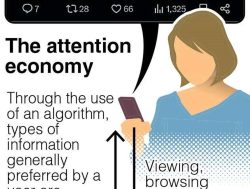Classroom Crisis / Is Overuse of Devices Affecting Student Discipline?

The Yomiuri Shimbun
6:00 JST, June 8, 2023
Digitization is impacting children’s development. If children are exposed to inaccurate information online, it might adversely affect their ability to think clearly, use their imagination and make sound judgments. This is the first installment in a series probing the threat posed by digitization in schools.
***
One afternoon in January, as students at an elementary school in Chiba Prefecture tucked into pieces of banana with their school lunches, one of the pupils said: “You’ll die if you eat 320 bananas.”
The comment came from a fifth-grader who enjoys watching videos about urban myths online. “They’re so thrilling. I can’t get enough of them,” the 11-year-old boy said.
His bemused classmates asked, “Is it true?” The boy said in that moment he felt proud to have shared valuable information that he had found online.
The boy said he first encountered videos with such titles as “What happens after people die?” when he was searching for videos with tips for his favorite online games. He watched recommended videos with similar themes one after another.
In video games, characters don’t bleed even if they are attacked, the boy said, but he learned about the reality of death by watching such videos.
The boy also said he learned about the banana myth after watching videos with the purported lethal doses of various foods. “People die after drinking seven liters of water and one liter of soy sauce,” he said.
The dubious data on bananas likely stems from the amount of potassium in the fruit. Excessive consumption of the mineral is harmful.
An official of the Cabinet Office’s Food Safety Commission said: “It’s inappropriate information that unnecessarily makes people anxious. As long as people eat normal amounts, there is no problem.”
Even so, the boy is adamant the information he shares is correct because, he said, many videos back up his claims.
His classmates show interest in his revelations initially, but soon get bored so he said he’s always on the lookout for new information. He uses his smartphone for two hours a day on weekdays and six hours on weekends.
Recently, the boy has been having behavior issues and his homeroom teacher has had to contact his mother a few times. “I’m worried this could escalate to the extent that he becomes a bully or has suicidal thoughts,” his mother said anxiously.
In the digital world, capturing attention is prioritized over accuracy. Platforms recommend things to users based on their browsing history and other data, raising the risk that people could end up being bombarded with biased information.
“As children have little experience in society, they are especially prone to influence,” said Hiroko Kano, an associate professor at Yamagata University. “They may be influenced by the language and expressions used on certain online sites, and this may result in misbehavior.”
Digital devices in classrooms could also pose a threat to teachers. Under the government’s Global and Innovation Gateway for All (GIGA) initiative, elementary and junior high school students receive digital devices for learning, and they can access the internet even during class.
An elementary school teacher in Shiga Prefecture said she trembles when she sees children absorbed in their digital devices.
A fourth-grader goaded her once saying, “Don’t you know this? You’re a teacher, aren’t you?” She said the boy had been reserved before the summer holidays, but his attitude changed after the break. He kept on looking at his device during class and started quizzing his classmates.
Initially, the questions were about trivia, such as the number of prefectures with streetcar services, but the questions got more difficult, and he started quizzing classmates about mathematics and science topics that are not covered in elementary school curriculums.
One day, the boy asked the teacher a historical question in the manner of a YouTuber with exaggerated hand movements and facial expressions. When the teacher told him to open his textbook, he stated the correct answer and insolently leaned back in his chair.
The teacher kept fending off questions, but after a while, students began saying things like, “You don’t know anything.” The children stopped responding to her instructions, even when she told them to submit documents or stand in a line, which disrupted the class.
An official of the Education, Culture, Sports, Science and Technology Ministry said such problems occur only in certain schools and are limited. However, many teachers are struggling to cope with such problems.
“There have always been children who want to show off their knowledge and express opinions, but with internet use widespread, the comments have gotten more polarizing and radical,” said Keiko Akimitsu, a professor at Hyogo University of Teacher Education. “We need to make sure that not only the child in question but the whole classroom thinks about the problem so that the children around them are not influenced.”
Popular Articles
Popular articles in the past 24 hours
-

Nagano Pref. Village to Introduce Fines for Some Disruptive Behav...
-

Santa Claus Delivers Christmas Presents to Penguins at Aquarium i...
-

Earthquake Damage Estimates Report Highlights Challenges Faced by...
-

M5.5 Earthquake Hits Japan’s Aomori and Iwate Prefectures; No Tsu...
-

Students Recreate 19th-Century Bento Boxes Made for Ino Tadataka'...
-

Outline for Tax System Reform: Put Japan’s Economy on New Growth ...
-

My Husband is Extraordinarily Strict with our Daughter, Who is St...
-

U.S. Plans to Stop Recommending Most Childhood Vaccines, Defer to...
Popular articles in the past week
-

Israeli Tourists Refused Accommodation at Hotel in Japan’s Nagano...
-

Tsukiji Market Urges Tourists to Avoid Visiting in Year-End
-

China to Impose Sanctions on Shigeru Iwasaki, Former Head of Japa...
-

U.S. Senate Resolution Backs Japan, Condemns China's Pressure
-

Japan to Support Central Asian Logistics Route That Bypasses Russ...
-

Speed Skater Yukino Yoshida Clinches Ticket to Milan
-

Kenta Maeda Joins Rakuten Eagles; Returns from American MLB to Ja...
-

Sharp Decline in Number of Chinese Tourists But Overall Number of...
Popular articles in the past month
-

Keidanren Chairman Yoshinobu Tsutsui Visits Kashiwazaki-Kariwa Nu...
-

Imports of Rare Earths from China Facing Delays, May Be Caused by...
-

University of Tokyo Professor Discusses Japanese Economic Securit...
-

Japan Pulls out of Vietnam Nuclear Project, Complicating Hanoi's ...
-

Govt Aims to Expand NISA Program Lineup, Abolish Age Restriction
-

Blanket Eel Trade Restrictions Rejected
-

Key Japan Labor Group to Seek Pay Scale Hike
-

M4.9 Earthquake Hits Tokyo, Neighboring Prefectures
"Society" POPULAR ARTICLE
-

M4.9 Earthquake Hits Tokyo, Neighboring Prefectures
-

M7.5 Earthquake Hits Northern Japan; Tsunami Waves Observed in Hokkaido, Aomori and Iwate Prefectures
-

Israeli Tourists Refused Accommodation at Hotel in Japan’s Nagano Pref., Prompting Protest by Israeli Embassy and Probe by Prefecture
-

Tsukiji Market Urges Tourists to Avoid Visiting in Year-End
-

M5.7 Earthquake Hits Japan’s Kumamoto Pref., Measuring Upper 5 Intensity, No Tsunami Expected
JN ACCESS RANKING
-

Keidanren Chairman Yoshinobu Tsutsui Visits Kashiwazaki-Kariwa Nuclear Power Plant; Inspects New Emergency Safety System
-

Imports of Rare Earths from China Facing Delays, May Be Caused by Deterioration of Japan-China Relations
-

University of Tokyo Professor Discusses Japanese Economic Security in Interview Ahead of Forum
-

Japan Pulls out of Vietnam Nuclear Project, Complicating Hanoi’s Power Plans
-

Govt Aims to Expand NISA Program Lineup, Abolish Age Restriction





